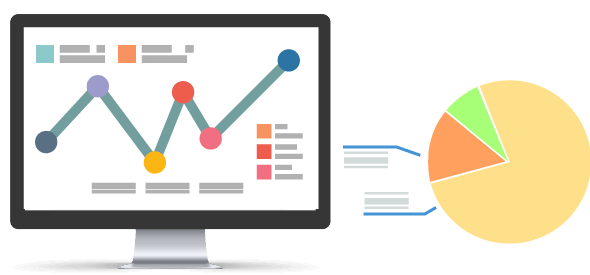Last updated: December 16, 2025

AI’s moment has arrived. While 50% of major corporations (from explodingtopics.com) are just beginning to explore artificial intelligence, event professionals are leading the charge, with 67% (from gevme.com) already using AI for event planning.
As events grow more complex and organizers face mounting demands, AI offers a cost-effective way to streamline work and increase efficiency. Whether you’re using AI event tools like ChatGPT or others, the principles are pretty much the same.
Let’s discuss how the pros are actually using these tools, what’s delivering real results, and where you need to proceed with caution.
Why Should You Use AI for Event Planning in 2026
Broadly speaking, AI saves time and money. It handles the grunt work – assistant, writer, planner, brainstorming partner – without complaining or needing leave, working 24/7. Tasks that take you days, like creating multiple social posts, detailed schedules, or personalized emails, can be done in a fraction of the time.
With so many free AI tools for event planning, you can work smarter, not harder, planning more events, reducing stress, and focusing on the high-value work that only humans can do, like building relationships and making creative decisions.
What Should You Use AI For While Planning An Event?
Here’s how using AI for event planning makes work faster, smarter, and more efficient:
Get Professional Document Frameworks
Feed ChatGPT your event specifications and get a structured starting point for sponsorship proposals, event briefs, and marketing materials. While the initial draft will need your professional touch, laying out the core elements saves valuable planning time.
Solve Venue Problems Fast
Input your challenging venue requirements, and ChatGPT will provide multiple practical layouts and configurations. Whether you’re working with an awkward space, tight capacity limits, or complex setup restrictions, it offers fresh perspectives on space utilization.
Fix Guest Communication Headaches
When 50 guests email asking about parking or dietary requirements, paste their questions into ChatGPT and your bullet-point answers. ChatGPT can do the finessing. Edit quickly and send a mass email – no need to type the same info repeatedly.
Turn Vague Client Requests into Plans
When a client says, “We want something innovative,” – ask ChatGPT to translate that into concrete event concepts. “Generate three event concepts for a tech company that wants innovative but not gimmicky, budget $100k, 150 guests.”
Make Budgets Work
Input your budget constraints and let AI suggest where to save. “How can I create a luxury feel at a corporate dinner for 100 people with only $15k?” It’ll break down realistic options across catering, decor, and entertainment.
6 Things AI Can Do For Your Event Right Now
From our hands-on testing, we’ve found ChatGPT for events works best for writing tasks. Here are some quick wins to get you started:
1. Create Event Website Content
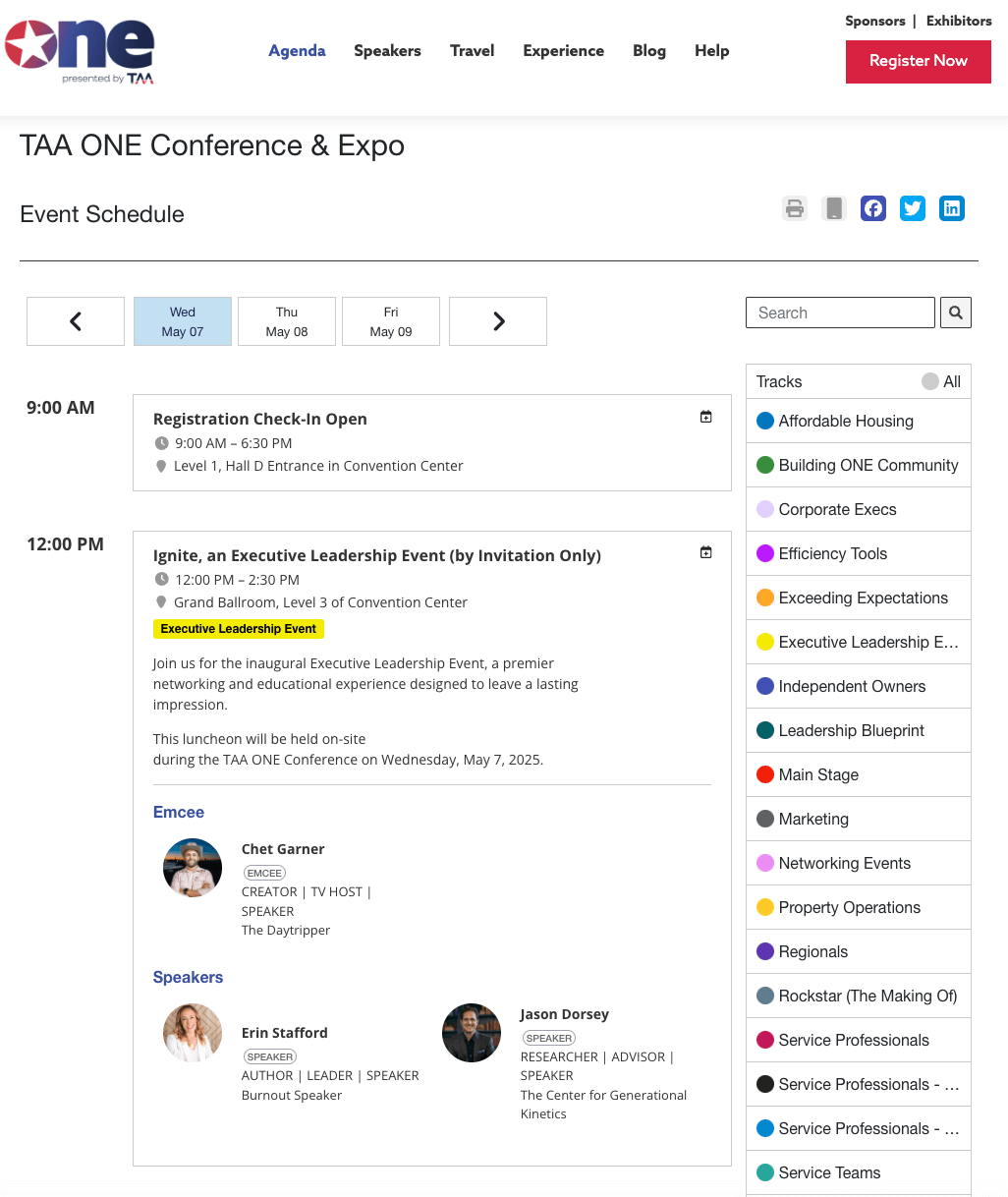
Whova’s event agenda webpage
AI can help create an event webpage and generate content for your website. From landing pages to speaker bios, schedules to registration pages, give it the key details, and it’ll write a tailored copy for each page’s specific purpose.
For editing, AI helps refine clunky sections, tighten wordy paragraphs, and maintain a consistent voice across your site. Bored of the same old “Register Now” button? Ask AI for fresh call-to-action phrases that still drive sign-ups.
Pro tip: Whova has a built-in AI companion to enhance event descriptions, saving you hours of editing time.
2. Come Up With Poll Questions
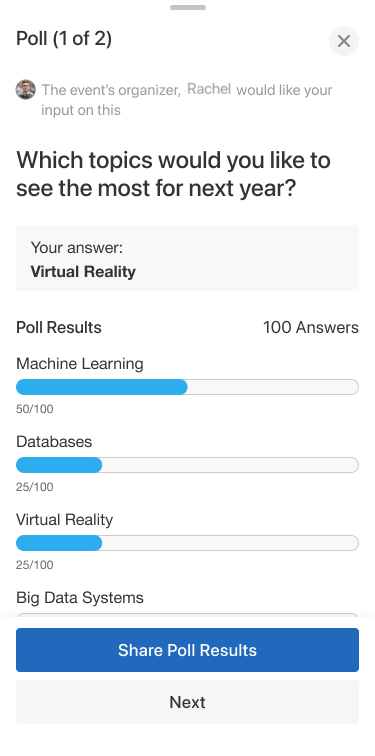
Whova’s live poll questions on the event app
Stuck on what to ask your audience? AI can generate live poll questions for any event at the moment. Simply input your topic or theme and get questions tailored to your specific sessions.
When we asked ChatGPT, it offered the following:
- Icebreaker Questions: “What’s your biggest industry challenge right now?” “Which skill do you most want to develop at this conference?”
- Live Session Questions: “Which of these strategies would be hardest to implement at your company?” “What’s your key takeaway from this presentation?”
Pro tip: Give AI your audience’s seniority level and industry to get questions that hit the right note.
3. Come Up With an AI Event Planning Checklist
AI simplifies checklist creation for your event. Tell it about your conference, gala, or workshop, and it’ll create a thorough task list customized to your needs.
The more specific your prompt, the more detailed your event planning checklist will be, covering everything from early planning through to post-event tasks.
Pro tip: download Whova’s free event planning checklist template to get you started, or check out some commonly missed event planning checklist details below:
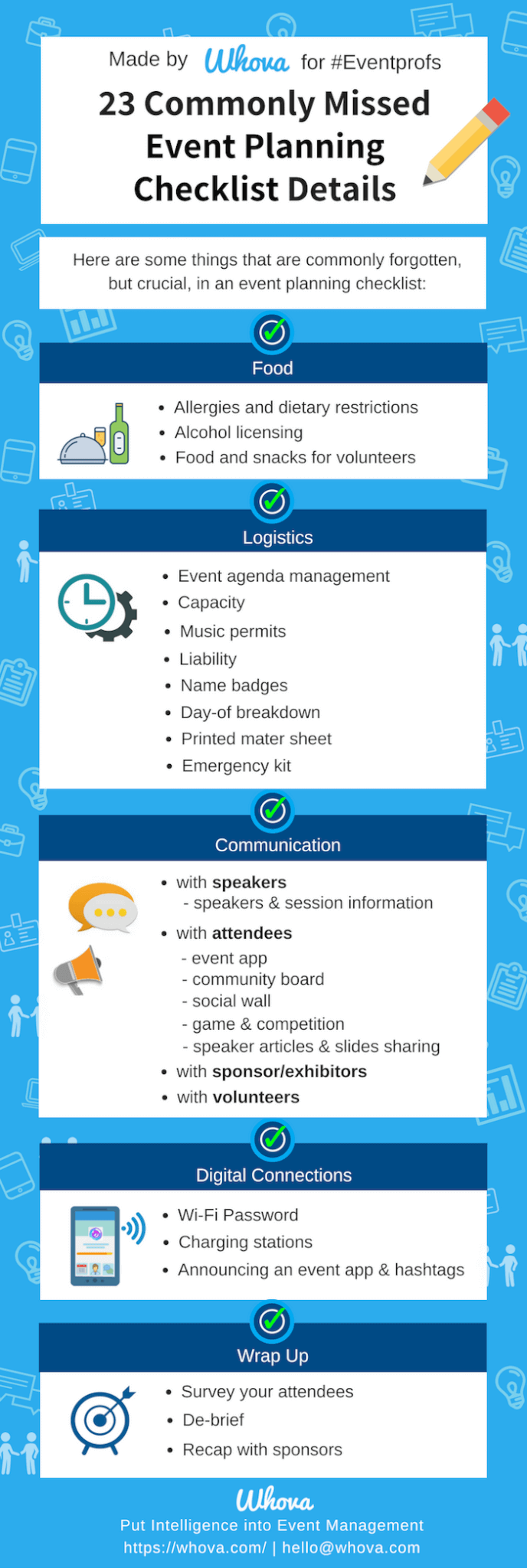
Already have a checklist? Use AI to spot anything you might have missed, from backup power to dietary tracking. Get help to organize your timeline in a way that makes sense. It’s like having an experienced AI event planner double-check your work.
4. Write speaker bios
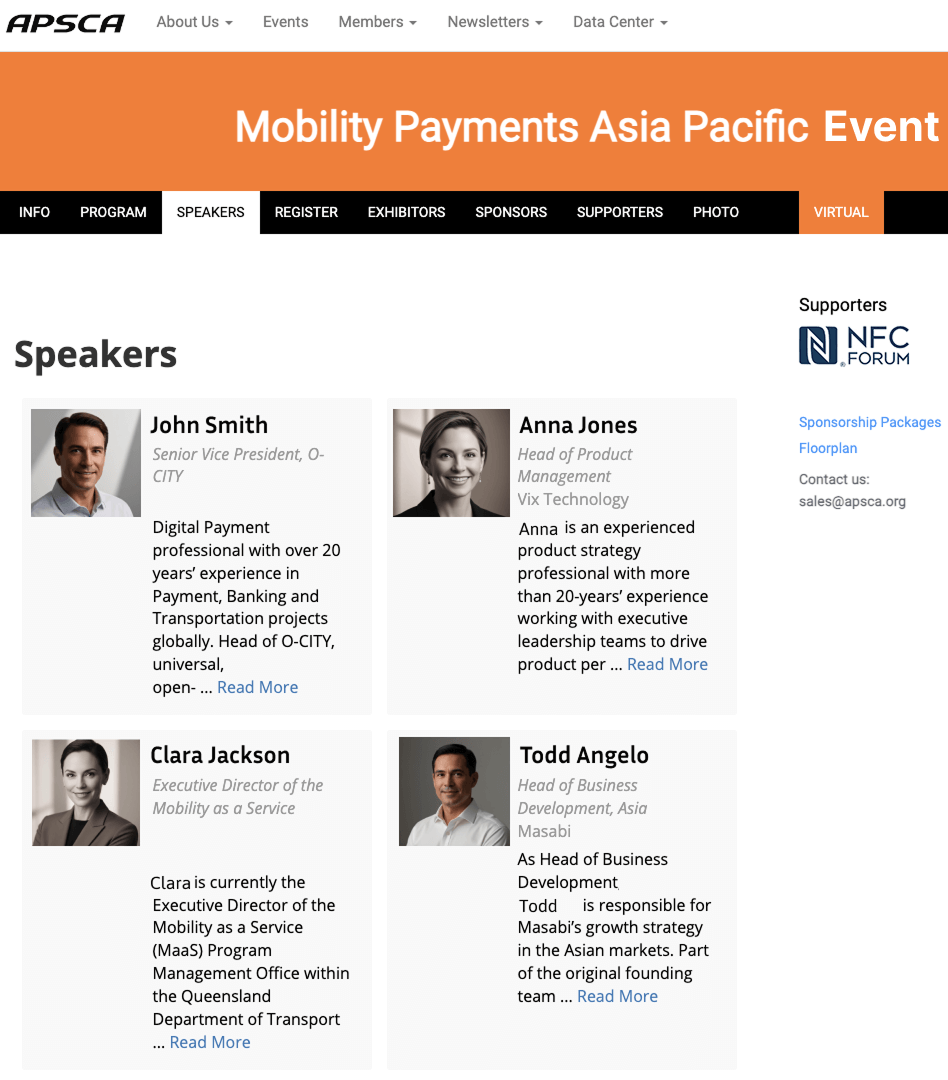
Whova’s speaker webpage
We’ve all seen those flat speaker bios filled with endless job titles and certifications. Give ChatGPT your speaker’s information (experience, achievements, current role), and it will create bios highlighting what matters to your audience.
For better networking, ask it to add conversation starters like “Ask me about transforming remote teams” or “Let’s discuss the future of sustainable tech.” These hooks give attendees natural opening lines for those coffee break conversations.
5. Write an event summary
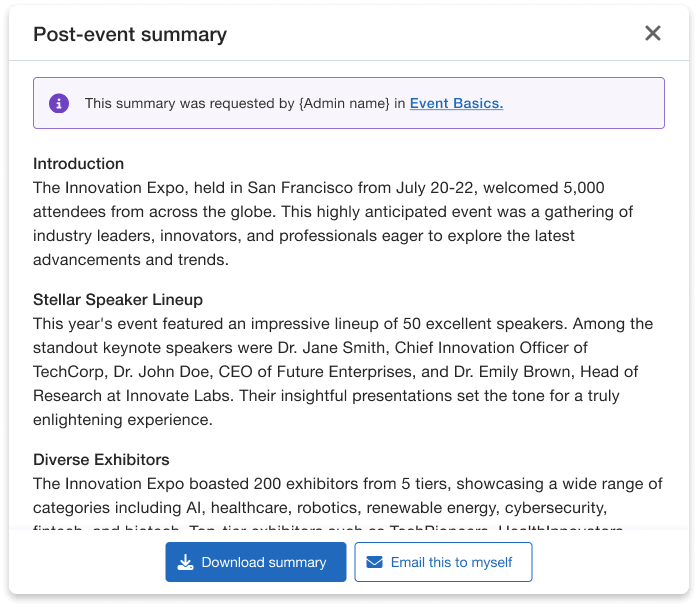
Whova’s AI event summary is a great tool to save time and get your summary right after your event.
Need to report different things to different stakeholders? ChatGPT converts event data into targeted summaries. For sponsors, ask it to focus on ROI and engagement numbers. For attendees, request summaries of key learnings and next steps. For speakers, have it highlight their session impact.
Share your numbers, highlights, and feedback, and ChatGPT organizes it into a clear format. You can request anything from bullet points to a detailed report outline.
Or simply use Whova.
Our AI-Generated Event Summary feature is already built in. It automatically pulls together your key metrics and produces a report with basic event details, attendance numbers, session counts, speaker highlights, registration revenue, and exhibitor and sponsor participation.
6. Create general or trivia questions
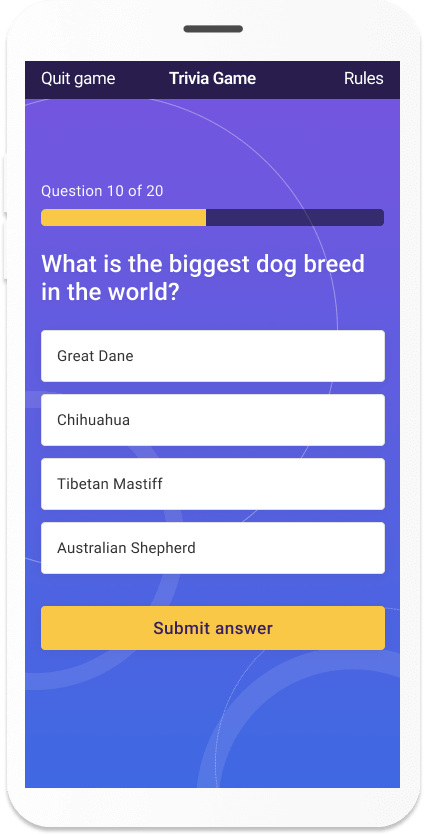
Whova’s AI trivia question generator is an easy to use tool to create questions on the fly for your attendees.
With the vast knowledge base of AI search engines, you can easily get a list of general trivia questions based on specific themes. If you don’t have too much time to organize engagement activities for attendees, just put a theme and the number of questions in the prompt and the AI search engine will take charge on coming up with interesting questions.
You can also feed in more context about your event and your exhibitors in order for the AI search engine to come up with event related questions. These questions will serve as a great engagement tool for attendees to go around the venue and look for the right answers to the trivia.
How to Write Successful Prompts for AI Event Planning
ChatGPT delivers best when fed specifics. Vague prompts get vague results. So, like any tool, output quality directly matches your input.
Here are five simple tips to help you get better results from ChatGPT:
- Start with what, where, when, and who: For any event task, giving these basic details helps ChatGPT understand exactly what you need. “Create a checklist for our sustainability conference – 50 people, Saturday morning in July, 6 hours” clearly states what you need.
- Mention your audience: “Create social media posts about our business conference targeting CEOs, CFOs, and COOs” works better than “Write social media posts for business people”
- Add numbers and details: Instead of “Make a timeline,” try “Create an hour-by-hour timeline for a one-day corporate conference from 8 AM setup to 6 PM cleanup, including breaks.”
- Share the tone you want: “Write a warm welcome speech for Harvard University’s science faculty gathering” or “Create an opening speech for HBO’s corporate event” ensures the content matches your event’s atmosphere and audience expectations.
- Use role-specific prompts: “Write as if you’re a director of one of the best AI conferences explaining key trends” or “Respond as an experienced tech event organizer sharing engagement strategies” to get more targeted, industry-specific insights.
The Downsides of Using AI for Event Planning
AI can crunch numbers and generate schedules in seconds, but it can’t replicate human intuition (yet!).
First up, hallucinations.
Imagine asking it to suggest entertainment options, and it confidently recommends a band that broke up years ago or invents a catering company that never existed. It could generate detailed reviews and pricing for these phantom vendors.
These “creative moments” mean you need to verify every suggestion against reality, especially when it comes to specific vendors, artists, or services it recommends.
Then there’s the robot-speak problem. AI loves phrases like “I’m happy to assist you with your event planning needs” or “Let me help you create a memorable experience.” Real event planners don’t talk like customer service bots! They say things like, “Let’s make this wedding amazing” or “I’ve got some great ideas for your corporate retreat.”
Another Pro tip: When using AI-generated content, read it aloud. Is it something you’d actually say to a client? Look for stiff phrases and replace them with your own voice. Break up long sentences, add some personality, and don’t be afraid to throw in industry-specific lingo that real event planners use.
Remember, using AI for events is like employing an assistant. It’s not your replacement. Use it to handle the heavy lifting of schedules and budgets, but let your human expertise shine through!
The Shift Isn’t Coming; It’s Here.
According to Amex GBT Meetings & Events 2025 Global Forecast, 50% of meeting planners worldwide were predicted to use AI in 2025. While you can use ChatGPT for specific tasks like writing copy or creating checklists, consider how much time you could save with an all-in-one solution.
Whova’s event management software has already integrated AI capabilities into our core features. Instead of juggling different tools, you get AI-powered content creation, attendee engagement, analytics, and essential planning features all in one.
Don’t wait until AI becomes industry standard. Start exploring these tools now, understand their capabilities, and give yourself a competitive edge.
Learn more how AI can help your event planning.
Ready to see how AI can transform your event planning? Schedule a Whova demo today.

